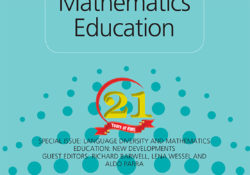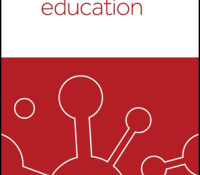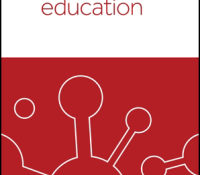tandfonline.com har udgivet en rapport under søgningen “Teacher Education Mathematics”: ABSTRACT ABSTRACT The beginning of primary education is an important time to form a good basis for students to develop their digital competence. However, the use of digital technologies is seldom a part of everyday schoolwork during the first years of primary school education. Furthermore, instruction on digital competence is often loosely connected to the students’ own ideas. Since there is obviously a need to investigate student-initiated involvement, this case study examined six to seven-year-old children’s views and ideas of using digital technology in school lessons through drawings and interviews. The results show that some of the students did not share the idea of using digital technology in their school lessons but most of the students did. In particular, the students expected digital… Continue Reading →
Like this:
Like Loading...
tandfonline.com har udgivet en rapport under søgningen “Teacher Education Mathematics”: ABSTRACT ABSTRACT Background: To make students more interested and engaged in science, new teaching approaches have been developed aiming at higher order thinking. Context-based learning approaches emanate from an idea that science content knowledge should be presented in a relevant context for students to improve their learning outcomes as well as making them more engaged in science. Previous research on context-based learning approaches has shown positive results; however, researchers and teachers need to explicitly consider which aspects of the contextual settings young students perceive as interesting and relevant to improve chemistry education. Purpose: In this paper, the constructs of ‘interest’ and ‘relevance’ are explored to analyse which aspects of open-ended chemistry problems engage students. Sample and Design: Both qualitative interview… Continue Reading →
Like this:
Like Loading...
tandfonline.com har udgivet en rapport under søgningen “Teacher Education Mathematics”: Psychological aspects of equation-based modelling Link til kilde
Like this:
Like Loading...
tandfonline.com har udgivet en rapport under søgningen “Teacher Education Mathematics”: ABSTRACT ABSTRACT This article gives the demographic characteristics of the U.S. homeschooling population and the reasons that parents choose to homeschool, summarizes the findings of studies on the homeschool learner outcomes of academic achievement, social development, and success in adulthood, and proposes future research on parent-led home-based education. The majority of peer-reviewed studies on academic achievement reveal a positive effect for the homeschooled students compared to institutional schooled students, while a few studies show mixed or negative results. Regarding social and emotional development, a large majority of studies show clearly positive outcomes for the homeschooled compared to those in conventional schools. A majority of the studies on the relative success of the home-educated who later became adults show positive outcomes… Continue Reading →
Like this:
Like Loading...
tandfonline.com har udgivet en rapport under søgningen “Teacher Education Mathematics”: Abstract Abstract This study explores what opportunities for critical literacy work that can be distinguished in the practices of an emerging digitalised classroom and how teachers and students make use of these. Observations were conducted over the course of one semester in three subjects in a Swedish class of 13–14-year olds using individual tablets. The findings presented as thick descriptions suggest that different kinds of opportunities to develop critical literacy evolve in various activities and digital technologies become a resource in students’ work. However, these opportunities mainly occur in peer interactions outside the visible control of the teacher and never develop into further critical reflections. The study concludes that a deliberate emphasis on critical literacy work in the design of… Continue Reading →
Like this:
Like Loading...
eric.ed.gov har udgivet: This study employed latent class cluster analysis to explore students’ perceptions of what aspects of mathematical literacy, composed of mathematics competencies and attitudes, teachers should focus on. The sample included 1,219 Taiwanese senior high school students and 59 mathematics teachers. Three profiles were identified for mathematics competence, which were characterized as comprehensive, test-oriented, and limited thought-oriented. Regarding mathematics attitudes and mathematics learning attitudes, three profiles were identified and characterized as: broad, math-interior oriented, and mind-focused. Students and teachers differed in their perceptions on the importance of some aspects of mathematical literacy. [For the complete proceedings, see ED597799.] Link til kilde
Like this:
Like Loading...
tandfonline.com har udgivet en rapport under søgningen “Teacher Education Mathematics”: Abstract Abstract This paper reports on the reading motivation and reading activity of 402, urban, Namibian learners in 6 schools in the central region of Namibia. From the fourth grade these Grade 7 learners received their instruction through the medium of English, and offered English as Second Language in addition to another Namibian language. They were enrolled in schools that performed above-average in the Namibian Standardised Achievement Test for English language and with reasonable access to reading resources. Employing adapted formats of instruments, developed by John T. Guthrie and colleagues, the relationships between various aspects of reading motivation, reading activity and achievement, as well as gender differences, were explored. Different from early adolescent readers in North America, the group showed… Continue Reading →
Like this:
Like Loading...
eric.ed.gov har udgivet: Mathematical development processes begin long before school starts and the importance of previous mathematical knowledge for later school achievements is beyond dispute. For a suitable pre-school education, the focus of interest must be to find out which early learning processes prepare children best. In this article, the acquisition of the key concepts of numeracy is presented in a developmental model, which served as framework for a supportive programme for 4-8 year-old children. The research into this intervention shows how development-oriented support of key arithmetic concepts can be constructed and taught systematically. The immediate and sustainable effect of the programme “Mina and the Mole” on the mathematical competencies of children has already been demonstrated in an evaluation study of 248 children aged 5-7. Considering the strong language-orientation of… Continue Reading →
Like this:
Like Loading...

tandfonline.com har udgivet en rapport under søgningen “Teacher Education Mathematics”: ABSTRACT ABSTRACT Recently the prevailing language-as-resource metaphor has been problematised and theorised. Using the philosophical theory of inferentialism, we trace an epistemological dimension of multilingualism in mathematics education and add it to the current language-as-resource discussions. With data from two different settings—a mathematics classroom in Sweden and a workshop in an indigenous settlement in Colombia—we show that in encounters between language practices and plural mathematics, the semantic and the epistemological are two sides of the same coin. Inferentialism captures such encounters without dichotomising either languages or mathematics. We contend that epistemological issues move beyond the scope of language-as-resource approaches, but they are not paths to improving school achievement. Neither are they matters of distinguishing between formal and informal language use.… Continue Reading →
Like this:
Like Loading...






